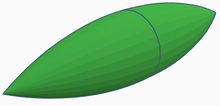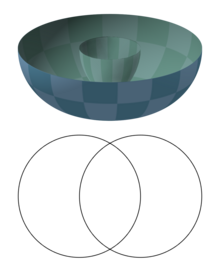In geometry, a lemon is a geometric shape that is constructed as the surface of revolution of a circular arc of angle less than half of a full circle rotated about an axis passing through the endpoints of the lens (or arc). The surface of revolution of the complementary arc of the same circle, through the same axis, is called an apple.


The apple and lemon together make up a spindle torus (or self-crossing torus or self-intersecting torus). The lemon forms the boundary of a convex set, while its surrounding apple is non-convex.[1][2]

The ball in North American football has a shape resembling a geometric lemon. However, although used with a related meaning in geometry, the term "football" is more commonly used to refer to a surface of revolution whose Gaussian curvature is positive and constant, formed from a more complicated curve than a circular arc.[3] Alternatively, a football may refer to a more abstract orbifold, a surface modeled locally on a sphere except at two points.[4]
Area and volume
editThe lemon is generated by rotating an arc of radius and half-angle less than about its chord. Note that denotes latitude, as used in geophysics. The surface area is given by[5]
The volume is given by
These integrals can be evaluated analytically, giving
The apple is generated by rotating an arc of half-angle greater than about its chord. The above equations are valid for both the lemon and apple.
See also
editReferences
edit- ^ Kripac, Jiri (February 1997), "A mechanism for persistently naming topological entities in history-based parametric solid models", Computer-Aided Design, 29 (2): 113–122, doi:10.1016/s0010-4485(96)00040-1
- ^ Krivoshapko, S. N.; Ivanov, V. N. (2015), "Surfaces of Revolution", Encyclopedia of Analytical Surfaces, Springer International Publishing, pp. 99–158, doi:10.1007/978-3-319-11773-7_2
- ^ Coombes, Kevin R.; Lipsman, Ronald L.; Rosenberg, Jonathan M. (1998), Multivariable Calculus and Mathematica, Springer New York, p. 128, doi:10.1007/978-1-4612-1698-8, ISBN 978-0-387-98360-8
- ^ Borzellino, Joseph E. (1994), "Pinching theorems for teardrops and footballs of revolution", Bulletin of the Australian Mathematical Society, 49 (3): 353–364, doi:10.1017/S0004972700016464, MR 1274515
- ^ Verrall, Steven C.; Atkins, Micah; Kaminsky, Andrew; Friederick, Emily; Otto, Andrew; Verrall, Kelly S.; Lynch, Peter (2023-01-23), "Ground State Quantum Vortex Proton Model", Foundations of Physics, 53 (1): 28, doi:10.1007/s10701-023-00669-y, ISSN 1572-9516, S2CID 256115776
External links
edit- Weisstein, Eric W., "Lemon Surface", MathWorld
- Football shaped (spindle type) surface of positive constant curvature in the University of Groningen model collection